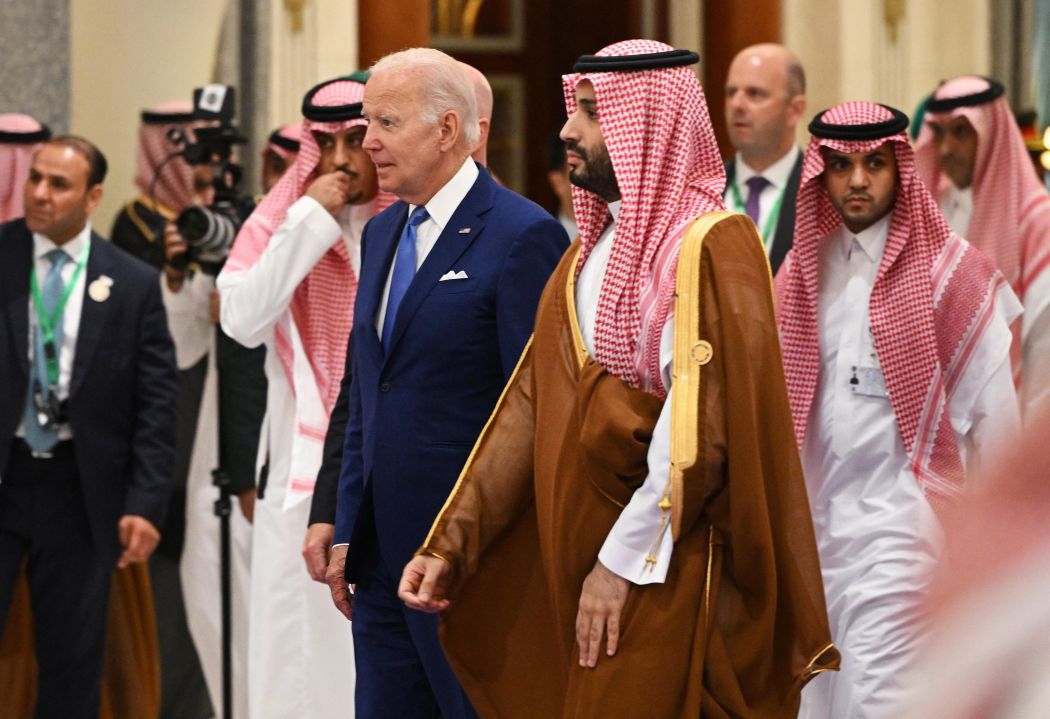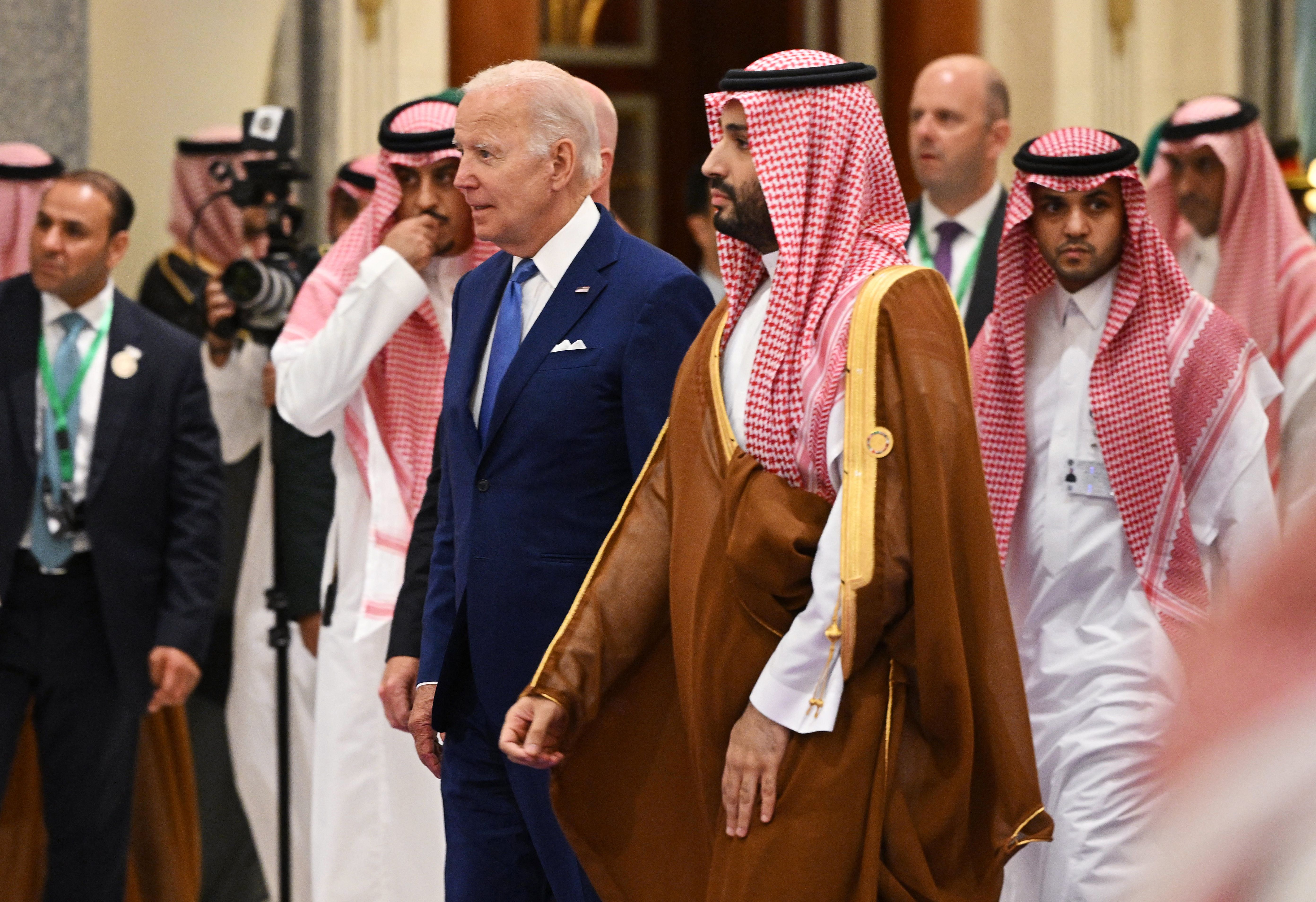Saudi Arabia’s energy minister had some cheeky words for the Biden administration this week: don’t blame us for manipulating the oil markets, and start acting like grown-ups.
Standing on stage at the Saudi-organised Future Investment Initiative, known as ‘Davos in the Desert’, Prince Abdulaziz bin Salman laid into American officials. Not only was Washington responsible for where oil prices are today, but they were also selfishly expecting Saudi Arabia to sacrifice its own economic interests for the sake of the West’s foreign policy. ‘We keep hearing you “are with us or against us”, is there any room for “we are with the people of Saudi Arabia?”’ the kingdom’s top oil man said.
This month’s decision by the oil cartel Opec+ to reduce crude output by two million barrels a day has roiled a relationship that was already deteriorating. For Washington, it was the latest evidence of the kingdom’s unreliability as a custodian of world oil supplies. The fact the oil cut came months after President Biden traveled to Saudi Arabia, at significant political risk, and paid homage to the brash, arrogant Crown Prince (the same man Biden promised to turn into a pariah following the murder of Jamal Khashoggi) was seen as a direct and premeditated insult. That the Biden administration believed they struck a deal with Crown Prince Mohammed to keep oil production stable, only to learn that, in MBS’s eyes, no deal was actually agreed upon, only angered the Americans further.
After the oil cut, Biden promised to ‘re-evaluate’ US-Saudi relations, turning full-circle back to his 2020 campaign line that the oil-for-security arrangement, which long served as the bedrock of the relationship, is becoming a relic. (Of course, this oil-for-security arrangement was always more myth than reality. Whether it was the 1973 oil embargo, the massive Saudi production plummet in the mid-1980s to undermine producers in North America, or the Saudi attempt in 2014 to bankrupt US shale producers, Riyadh isn’t afraid to upset America in pursuit of its own interests.) The Saudi royals, though, who always seem to call America’s bluff whenever officials in Washington get angry, remain confident that the world’s only remaining superpower will eventually come around — it needs Saudi Arabia just as much as Saudi Arabia needs the US.
This latest spat, however, helped by Prince Abdulaziz’s comments, may be one betrayal too far. Khashoggi’s murder and the outrage it produced came on top of Riyadh’s ineffectual military campaign in Yemen (which basically amounted to bombing everything in sight and putting a quarantine around the Yemeni ports, helping create famine-like conditions). This combination put the kingdom’s likability into the sewer. But in a 23 October poll of Americans, only 14 per cent had a favourable view of Saudi Arabia, and nearly half thought the kingdom either unfriendly to the United States or an outright enemy. The Saudis have never seen such low numbers — not even after the 9/11 attacks, in which 15 of the 19 hijackers were Saudi nationals.
The political bonds between America and Saudi Arabia are weathering too. Relations between the countries have never been anchored by people-to-people ties – Americans aren’t culturally that similar to Saudis – and the relationship isn’t really institutionalised, at least outside the realm of counterterrorism and defence. There are no shared values or historical experiences between the two countries either. One is a free-market democracy, the other is a monarchy that doesn’t tolerate dissent, shakes down its own financial heavyweights for tax revenue, and doesn’t have a written constitution. The partnership is top heavy, sustained by the presidents and kings of the moment and driven by a set of very narrow but common interests.
But Biden and MBS, two men of different ages, experiences, and backgrounds, won’t be holding hands like George W Bush and King Abdullah did. Biden thinks MBS is a rash, impatient, petulant millennial with a short temper and poor judgement. MBS views Biden as an ageing politician who is sanctimonious about human rights and can’t seem to forget about the Khashoggi incident. While there are officials below them who would like to bring the relationship back on track, it’s enormously difficult when the two at the top can’t stand each other.
The Saudis want to turn things around nonetheless. US and Saudi diplomats, trained to make the best of bad situations, don’t want relations to falling apart irrevocably. Princess Reema bint Bandar al-Saud, the Saudi Ambassador in Washington, insisted in a recent CNN interview on 25 October that all of the troubles can be resolved. ‘I deal very regularly with the administration, and frankly, it’s an administration that I have profound respect for.’ Others, like the Economist, believe that as bad as things are now, Washington and Riyadh don’t have a choice but to stick it out like unhappy spouses who can’t afford to get divorced.
Nobody, however, can say with a serious face that US-Saudi ties will persist as they did five, ten or thirty years ago. Saudi Arabia, now under the leadership of an abrasive and self-confident crown prince, is far more assertive and unapologetic than it was once. Prince Abdulaziz’s comments make that clear. The United States, the world’s most powerful country trying to move away from the Middle East after two consecutive decades of war there, is increasingly tired of tolerating the disrespect.







Comments